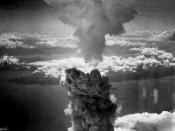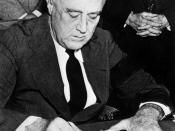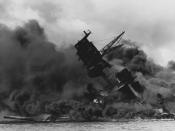While the growing danger of war became apparent, so did a rising desire for noninvolvement by Americans. Little did we know the neutrality acts that Congress would soon pass in favor of isolationism would play directly into Hitler's hands. Hitler could now proceed with his overtaking of specific territories without worrying about America's interference. He began by seizing Austria, demanding the Sudetenland, and finally breaking his promises at Munich by taking nearly all of Czechoslovakia. Roosevelt attempted to revise his neutrality acts to give assistance to England and France. As Congress refused, Hitler began World War II by invading Poland. Americans soon came to realize that they could no longer pursue a safe policy of neutrality and noninvolvement when their own democracy was at stake.
While the war continued in Europe, Japan had its eyes on French and Dutch possessions in the East Indies. Japan set out to incorporate these territories, rich in natural resources.
When Japan invaded China, the U.S. naturally responded by limiting needed resources to them such as oil, iron, and steel. Japan seemed un-phased as they signed the Tripartite Pact with Germany and Italy and invaded Indochina. The United States then came to the conclusion to end all trade with Japan. Japan decided they would try to negotiate with the United States, but threatened an attack if all of Japan's requests weren't granted, when in all actuality, Japan only wanted a free hand in China. When the United States demanded that Japan take their troops from China, Japan completely rejected the idea and bombed Pearl Harbor in a surprise attack that crippled the U.S. Pacific fleet. The very next day Roosevelt asked for a declaration of war, and it was approved. Germany and Italy then declared war on the United States and the nation became fully...


